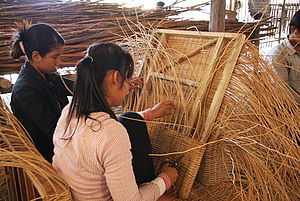
Sustainable Raw Materials for the German Automobile Sector
Sustainable Raw Materials for the German Automobile Sector
Extraction of metallic raw materials entails environmental and social challenges. Since Germany itself extracts only small amounts of metallic raw materials, German automotive companies depend on imports to cover their demands. Not only since the resolution on Human rights and transnational corporations and other business enterprises was adopted by the UN Human Rights Council in 2011, civil society and political decision makers have been urging transnational corporations to take responsibility and tackle challenges along their entire value chains of their products. Against this background, the question remains what German automotive companies could contribute to tackling environmental and social challenges related to the extraction of metallic raw materials.
Demand of the German automotive sector
Value chains in the automotive sector are complex. Companies deal with several thousand suppliers and adapt constantly to new technological innovations, which again will impact the chain. German automotive companies depend to a high level on metallic raw materials in order to produce a number of 5 million automobiles in 2013. It can be estimated that the automotive sector in Germany uses about 30 percent of aluminum, about 15 percent of plumb, 13 of steel and 12 of total copper imported to Germany.
The project
Within the framework of the project “Sustainable Extraction of Raw Materials and Raw Material Efficiency through Sustainable Consumption in the Automobile Sector“ the CSCP in collaboration with its project partners Südwind Institute e.V. and Global Nature Fund (GNF) identified social and environmental challenges related to different metals used by automotive companies in Germany and, together with stakeholders from the sector, discussed possible measures for improvements. The project was funded by the Federal Environment Agency (UBA).
The objective of the project was to encourage the automotive sector to increase their performance concerning environmental and social aspects of raw material extraction and inform and sensitize the end consumers to impacts of mining and extraction in countries of origin. The output of the project is a study describing major challenges and possible measures for the automotive companies to tackle these challenges, which can be downloaded below. Central findings of the study were discussed in the framework of a multi-stakeholder event bringing together relevant actors from the German automotive sector, such as companies, civil society and representatives from political institutions.
Challenges related to raw material extraction and possible solutions
The study found social and environmental challenges related to the extraction of metallic raw materials used in cars. In the environmental dimension, water and energy use, emissions into water and air or the loss of biodiversity are major challenges related to the extraction of metallic raw materials. In the social dimension, problematic working conditions, insufficient health and safety conditions, low payments or land grabbing can be challenges related to resource extraction. Next to challenges the study also outlines already existing best practices and initiatives, which might help to lower negative impacts in the environmental and/or social dimension and improve sustainability performance of the sector. This also includes initiatives from other sectors such as the Responsible Jewellery Council (RJC) or the Global e-Sustainability Initiative (GeSI), which learning might be transferred to the automotive sector. Several fields of action were identified where the German automotive sector shows potential to improve its sustainability performance related to its metallic metals procurement:
· Accept responsibility for the entire value chain,
· Increase transparency
· Foster cooperation for sustainability
· Design even more environmental friendly designs
· Invest and promote more resource efficient mobility concepts.
The project has shown that, although value chains are highly complex in the automotive sector, there are leverage points and existing practices German automotive companies could take up to further reduce environmental and social risks related to their value chains and make their operations more sustainable.

For more information please contact:
Jan Per Bethge • Project manager
+49 (202) 459 58 12 • jan.bethge@scp-centre.org
